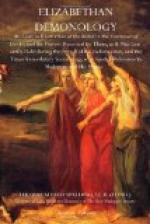7. A hard discipline, no doubt, but not more hard than salutary. Salutary in two ways. First, as a test of the student’s own earnestness of purpose. For in these days of revival of interest in our elder literature, it has become much the custom for flippant persons, who are covetous of being thought “well-read” by their less-enterprising companions, to skim over the surface of the pages of the wisest and noblest of our great teachers, either not understanding, or misunderstanding them. “I have read Chaucer, Shakspere, Milton,” is the sublimely satirical expression constantly heard from the mouths of those who, having read words set down by the men they name, have no more capacity for reading the hearts of the men themselves, through those words, than a blind man has for discerning the colour of flowers. As a consequence of this flippancy of reading, numberless writers, whose works have long been consigned to a well-merited oblivion, have of late years been disinterred and held up for public admiration, chiefly upon the ground that they are ancient and unknown. The man who reads for the sake of having done so, not for the sake of the knowledge gained by doing so, finds as much charm in these petty writers as in the greater, and hence their transient and undeserved popularity. It would be well, then, for every earnest student, before beginning the study of any one having pretensions to the position of a master, and who is not of our own generation, to ask himself, “Am I prepared thoroughly to sift out and ascertain the true import of every allusion contained in this volume?” And if he cannot honestly answer “Yes,” let him shut the book, assured that he is not impelled to the study of it by a sincere thirst for knowledge, but by impertinent curiosity, or a shallow desire to obtain undeserved credit for learning.
8. The second way in which such a discipline will prove salutary is this: it will prevent the student from straying too far afield in his reading. The number of “classical” authors whose works will repay such severe study is extremely limited. However much enthusiasm he may throw into his studies, he will find that nine-tenths of our older literature yields too small a harvest of instruction to attract any but the pedant to expend so much labour upon them. The two great vices of modern reading will be avoided—flippancy on the one hand, and pedantry on the other.




